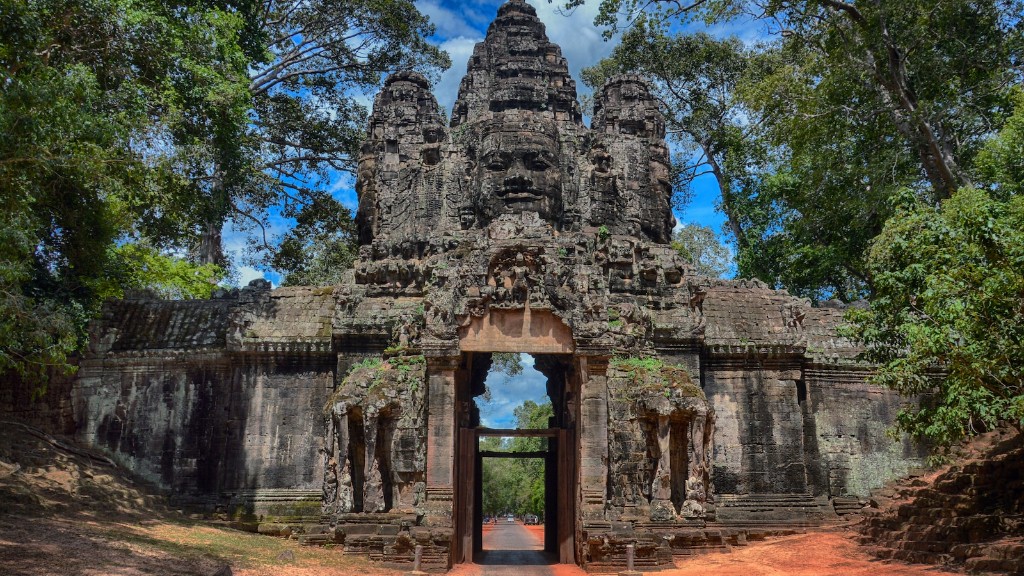Introduction
Buddhism and Hinduism are two of the oldest and most influential religions in both India and the world. They hold a special place in ancient Indian tradition and culture, and together form the bedrock of Indian spiritual thought and practice. Despite the close ties they share, they differ significantly in their beliefs, practices, and views on spiritual enlightenment. But how are Buddhism and Hinduism connected?
What is Buddhism?
Buddhism is a religion founded by Siddhartha Gautama, who is known as the Buddha, or “Enlightened One”. According to traditional Buddhist texts, around the 5th century BC, Siddhartha abandoned his royal life of pleasure and luxury in favour of a life of mindful meditation and spiritual enlightenment. He developed ethical codes of conduct, teachings on karma and reincarnation, and an eightfold path which outlines 8 aspects of life that should be practiced in order to reach liberation from suffering. Buddhism prescribes faithfulness to the teachings of the Buddha and is characterized by its commitment to living life in a state of constant mindfulness and spiritual awareness.
What is Hinduism?
Hinduism is an ancient, polytheistic religion originating from India. It is generally thought to have originated somewhere between 1500-1000 BC, making it one of the oldest religions in the world. Hinduism is based on the concept of Dharma, which is the realization and understanding of one’s true nature, purpose, and destiny. Hindus have an incredibly diverse range of beliefs and practices, but they all share the same idea of Dharma, or the concept of Righteousness and Duty. In Hinduism, knowledge and spiritual experience are paramount, which leads to the attainment of moksha, which is a state of bliss and perfect union with the Universe.
How Are They Connected?
Buddhism and Hinduism share many similarities due to their origin in the same part of India, such as the belief in karma, reincarnation, and strict adherence to a code of ethics. Buddhism and Hinduism both believe in the concept of Dharma and the attainment of spiritual enlightenment. But there are some key differences between the two religions, such as the rejection of Hindu polytheism by Buddhists and their focus on mindful meditation as a means to liberation from suffering. Buddhism and Hinduism also have their own distinct paths to liberation, with Buddhism focused on living life in a state of constant mindfulness and Hinduism utilizing knowledge and experience.
Importance of Dharma in Buddhism and Hinduism
One of the most important aspects that connect Buddhism and Hinduism is the concept of Dharma. Dharma is the realization and understanding of one’s true nature, purpose, and destiny. Hindus believe that Dharma is an essential part of their spiritual journey, as it is believed to lead one to the attainment of moksha, a state of bliss and perfect union with the Universe. Similarly, in Buddhism, Dharma is essential to the attainment of liberation from suffering and spiritual enlightenment.
In Buddhism, Dharma is enshrined in the Eightfold Path, which outlines 8 aspects of life that should be practiced in order to reach liberation. These include Right Livelihood, Right Thought, Right Speech, Right Action, Right Effort, Right Mindfulness, Right Concentration, and Right Understanding. Hinduism also prescribes certain practices to its adherents in order to achieve moksha. These include yoga, karma, and adherence to a strict code of ethical morality.
Influence of Buddhism on Hinduism
In the centuries since Buddhism’s inception, it has had a major influence on the development of Hinduism. Buddhism’s rejection of Hindu polytheism and its emphasis on mindful meditation has been incorporated into the Hindu belief system, with many Hindus today practising meditation as part of their spiritual practice. The concept of Dharma is integral to both Buddhism and Hinduism, and its importance in both religions has been further strengthened by their shared roots. Buddhism has also had a major impact on the art and culture of India, with its symbols and stories being appropriated and utilised in Indian literature and art.
Is Buddhism a Form of Hinduism?
Despite their shared roots and beliefs, Buddhism and Hinduism are two distinct religions. Though many of the early teachings of Buddhism have had a major influence on Hinduism, the two religions differ significantly in their interpretations of the concept of Dharma and how it should be practiced. Buddhism outright rejects the polytheism of Hinduism and is instead focused on the individual’s journey to liberation through mindful meditation and adherence to the Eightfold Path. Similarly, Hinduism focuses on the attainment of moksha through knowledge and experience.
Current Relationship Between Buddhism and Hinduism
Today, Buddhism and Hinduism have a unique relationship. Despite their differences and the controversy surrounding the origin of Buddhism, both religions share a common belief in Dharma and the importance of spiritual enlightenment. Though both religions continue to practice their own distinct paths to enlightenment, their shared roots and beliefs have created a strong bond between them. As a result, many modern Hindus view Buddhism as a form of Hinduism.
Influence of Buddhism in Modern Society
In recent years, Buddhism has had a major influence in the world, with its teachings of mindfulness, inner peace, and communal harmony being embraced by many in the West. In today’s society, the practice of meditation, yoga, and other forms of spiritual contemplation, have become increasingly popular and recognised for their health benefits. Buddhism’s tenets have also had an influence in the fields of psychology, education, and activism.
Does Buddhism Promote Selflessness or Self-Management?
Buddhism promotes both selflessness and self-management. Through its Eightfold Path, Buddhism encourages individuals to be mindful of their actions and to have compassion for all living things. At the same time, Buddhism also recognizes the importance of self-management, as it prescribes a code of ethics and encourages mindful meditation for the purpose of personal spiritual development. As such, Buddhism promotes both selflessness and self-management as integral aspects of its path to liberation.
Differences Between Buddhism and Hinduism
Though Buddhism and Hinduism have a lot in common, they also differ significantly when it comes to their beliefs and practices. Buddhism outright rejects the polytheism of Hinduism, instead focusing on mindful meditation and adherence to the Eightfold Path as a means to personal liberation. In contrast, Hinduism prescribes knowledge and experience as a means to achieving personal moksha.
Buddhism and Hinduism also differ in terms of their foremost figureheads. Buddhism was founded by Siddhartha Gautama, who is known as the Buddha and is venerated as the “Enlightened One”. In contrast, Hinduism does not have a single founder, but is instead characterized by a range of traditions and beliefs.
Conclusion
Buddhism and Hinduism are two ancient Indian religions that share many similarities due to their shared history and beliefs. They both believe in the concept of Dharma and have had a major influence on each other over the centuries. Though Buddhism and Hinduism are two distinct religions, they both have a unique connection and continue to be two of the most significant spiritual and cultural influences in India today.

